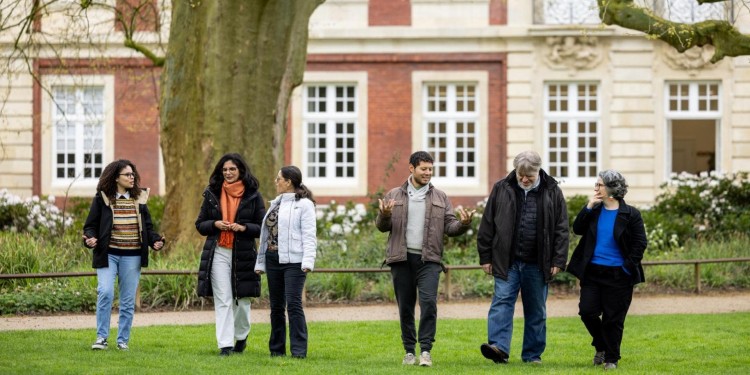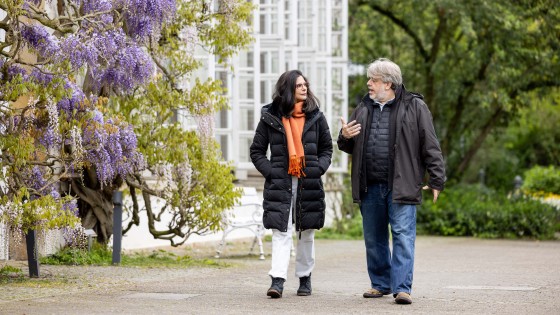
Building up long-term networks
If you get a search engine to calculate the distance between the Schloss in Münster and the Universities of Minas Gerais and São Paulo, the result it produces is around 10,000 kilometres. However, this long distance between them is no reflection at all of the relations which the University of Münster has with institutions in Brazil. Actually, as far as scientific activities are concerned, Münster is one of the most active foreign universities in Brazil. Two Brazilian researchers who are currently guests at the University of Münster symbolise the close networks: Prof. Elaine Maria Souza Fagundes and Prof. José Carlos Vaz are the incumbents of the ‘Brazil Chair’. This guest professorship is funded by the Brazilian Federal Agency for Support and Evaluation of Graduate Education (CAPES).
Elaine Maria Souza Fagundes and José Carlos Vaz are among the leading researchers in their respective fields. Elaine Maria Souza Fagundes is Professor of Physiology and Biophysics, researching at the Federal University of Minas Gerais in the field of pharmaceutical innovations. One of the focuses of her work is drug discoveries for cancer medication. José Carlos Vaz is Professor of Public Policy Management at the University of São Paulo. He researches into the deployment of technology in public administration, looking at what capacities the state needs in order to implement technological solutions for the promotion of democracy and the reduction of social inequalities. The guest professorship is an honour for both visitors. “I feel privileged to have this great responsibility of representing Brazilian science in Germany,” says Elaine Maria Souza Fagundes.

In order to promote synergies such as these, the Brazil Centre at the University of Münster supports researchers and students as regards stays and collaborations. In 2011 Münster University signed an institutional agreement with CAPES, and one central element since then has been the Brazil Chair for the purpose not only of increasing collaboration between researchers but also of raising the visibility of leading Brazilian researchers. Specifically, it involves an 18-month stay in Münster, including funding in each case for a doctoral student and a postdoc. Prof. Bernd Hellingrath, the Scientific Director of the Brazil Centre, sees this as an important development: “The fact that the researchers are now being accompanied by young scientists contributes significantly to building up long-term networks. It raises the visibility of the University of Münster in Brazil, and in Germany it highlights the strength of Brazilian science and research.”
José Carlos Vaz is the guest of Prof. Norbert Kersting at the Institute of Political Science, where he has found his temporary professional home. He finds the collaboration enriching, in both a professional and a personal sense. “Naturally enough, there are differences as regards the forms of organisation, the resources and the culture – but there are also similarities,” he says, adding that his home university is also a state institution with a focus on research. “We too are very much committed to teaching, and we have 97,000 students. There are highly qualified researchers working both here and in Brazil. I see a great number of opportunities for establishing important scientific collaborations,” he says.
Elaine Maria Souza Fagundes’ work takes place primarily in the laboratory, and this is where she sees the greatest differences. In Brazil, she says, resources are scarce and research budgets are much smaller. “I often have to wait months for an important reagent, and not all the equipment is available. Such things are faster and simpler in Germany.” In the working group headed by Prof. Johannes Eble at the Institute of Physiological Chemistry and Patho-Biochemistry, she is working on studies of the cancer-inhibiting and anti-metastatic effects of synthetic peptides – an important contribution to discovering a new pharmaceutical prototype for the treatment of breast cancer.
She always stays calm and never loses track of things. Precisely because resources in Brazil are scarcer, she says, many researchers there have developed an important virtue: creativity – a skill which, she says, is in demand everywhere. She sees benefits in the collaboration for both sides: “The methods developed here will be very important for future projects in Brazil, for example to produce more detailed studies,” she says. “The professorship helps us to disseminate the knowledge we have gained about our discoveries in Germany, and we can make contributions to the development of science and technology in both countries through joint patent applications, congresses and publications.”
Fruitful collaboration has also developed in the working group entitled ‘Comparative Political Science – Local and Regional Policy’. “Our aim is to undertake analyses and comparisons, for example between Latin-American and European initiatives, in order to understand how so-called ‘smart cities’ can use opportunities for promoting political involvement online,” José Carlos Vaz explains. In addition, the group plans to establish a network of people from research and from practical work and use the contributions they can make. “We want to aim this practical topic at a broad public, including non-academic people,” he explains.
Both researchers also look beyond the confines of their university surroundings. “I really like the city,” says José Carlos Vaz. “Having the opportunity to cycle to work every day is a privilege,” adds Elaine Maria Souza Fagundes. “What I see in Münster is a beautiful, well-organised, clean city full of attractions. In short, our stay here is a unique experience which we are savouring as much as we can.”
Author: Hanna Dieckmann
This article appeared in the University newspaper wissen|leben No. 3, 8 May 2024.
